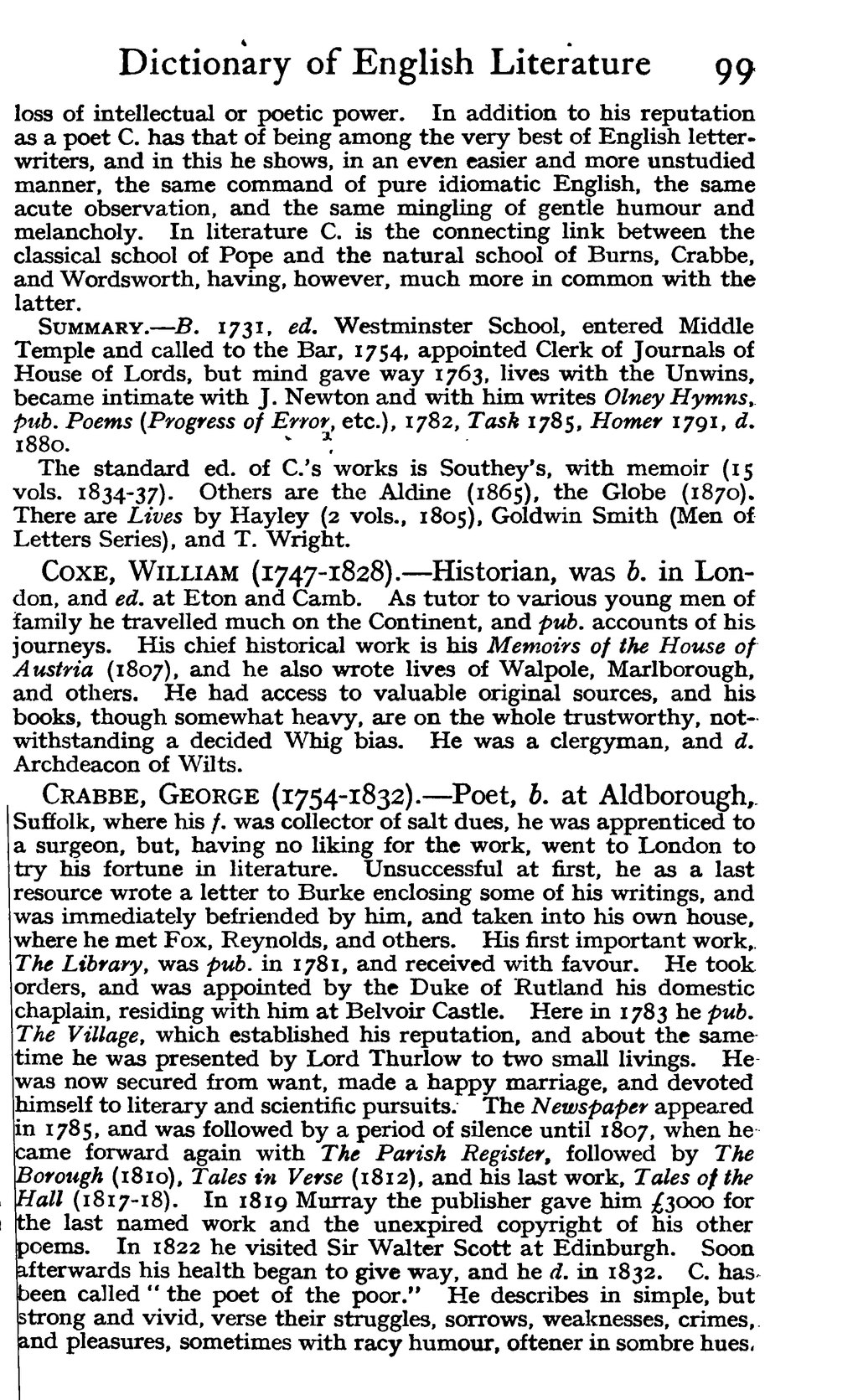loss of intellectual or poetic power. In addition to his reputation as a poet C. has that of being among the very best of English letter-writers, and in this he shows, in an even easier and more unstudied manner, the same command of pure idiomatic English, the same acute observation, and the same mingling of gentle humour and melancholy. In literature C. is the connecting link between the classical school of Pope and the natural school of Burns, Crabbe, and Wordsworth, having, however, much more in common with the latter.
Summary.—B. 1731, ed. Westminster School, entered Middle Temple and called to the Bar, 1754, appointed Clerk of Journals of House of Lords, but mind gave way 1763, lives with the Unwins, became intimate with J. Newton and with him writes Olney Hymns, pub. Poems (Progress of Error, etc.), 1782, Task 1785, Homer 1791, d. 1880.
The standard ed. of C.'s works is Southey's, with memoir (15 vols. 1834-37). Others are the Aldine (1865), the Globe (1870). There are Lives by Hayley (2 vols., 1805), Goldwin Smith (Men of Letters Series), and T. Wright.
Coxe, William (1747-1828).—Historian, was b. in London, and ed. at Eton and Camb. As tutor to various young men of family he travelled much on the Continent, and pub. accounts of his journeys. His chief historical work is his Memoirs of the House of Austria (1807), and he also wrote lives of Walpole, Marlborough, and others. He had access to valuable original sources, and his books, though somewhat heavy, are on the whole trustworthy, notwithstanding a decided Whig bias. He was a clergyman, and d. Archdeacon of Wilts.
Crabbe, George (1754-1832).—Poet, b. at Aldborough, Suffolk, where his f. was collector of salt dues, he was apprenticed to a surgeon, but, having no liking for the work, went to London to try his fortune in literature. Unsuccessful at first, he as a last resource wrote a letter to Burke enclosing some of his writings, and was immediately befriended by him, and taken into his own house, where he met Fox, Reynolds, and others. His first important work, The Library, was pub. in 1781, and received with favour. He took orders, and was appointed by the Duke of Rutland his domestic chaplain, residing with him at Belvoir Castle. Here in 1783 he pub. The Village, which established his reputation, and about the same
time he was presented by Lord Thurlow to two small livings. He was now secured from want, made a happy marriage, and devoted himself to literary and scientific pursuits. The Newspaper appeared in 1785, and was followed by a period of silence until 1807, when he came forward again with The Parish Register, followed by The Borough (1810), Tales in Verse (1812), and his last work, Tales of the Hall (1817-18). In 1819 Murray the publisher gave him £3000 for the last named work and the unexpired copyright of his other poems. In 1822 he visited Sir Walter Scott at Edinburgh. Soon afterwards his health began to give way, and he d. in 1832. C. has been called "the poet of the poor." He describes in simple, but strong and vivid, verse their struggles, sorrows, weaknesses, crimes, and pleasures, sometimes with racy humour, oftener in sombre hues,
